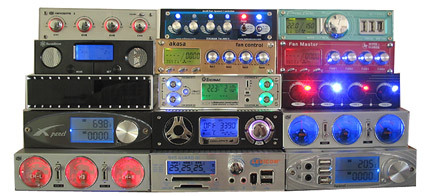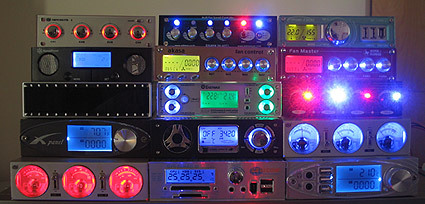Fighting Fan Noise Pollution
PC Fan Noise Relief
There is almost no PC hardware anymore that can get by without a fan. Now, the CPU, the graphics card, the motherboard and the case all require fans. If low-noise fans are not used, the decibel level quickly goes up to over 50 dB(A), which becomes unbearable. However, fan controller solutions exist that can help mitigate this noise pollution factor.
THG tested 15 fan control devices which, at least according to the manufacturers' specifications, are able to reduce noise levels effectively and cleverly. The basic premise is that fans do not always have to run at top speed and can be adjusted. With normal office usage, only low revolution numbers are necessary. Only with games or computing-intensive tasks do chips produce excessive heat. In those situations users generally can't escape the noise.
15 current fan controllers put to the test
Difference between daytime and nighttime operation: click on this image for a demonstration
Fan Controllers With A Display: Regulating Often Means Monitoring
If you want to regulate your fans you should also make sure that your fan controller features a temperature monitoring function. That at least gives you an idea of whether the turned-down fans are still sufficiently cooling the system. If the computer's internal temperature reaches a critical point, an alarm function is usually triggered in the form of a beep tone to signal that the system is getting too hot. You have to experiment until you find the optimal revolution settings. It's better for the fans to have a few revolutions too many than to end up with damage to your expensive hardware.
We can only recommend a few of our test candidates, since many of them lack a number of important functions that are necessary for trouble-free fan control and monitoring. It's no use reducing noise while dramatically increasing the risk of doing damage to your hardware.
A fan controller must thus monitor fan noise levels in addition to performing control and alarm tasks. It would also be ideal if the device could shut down the PC in the event of a critical situation. As of now, however, you have to do without that function or tweak the BIOS of the motherboard - it turns out that none of the test products could manage this. One should never give up hope, though, because this problem is being worked on.
Get Tom's Hardware's best news and in-depth reviews, straight to your inbox.
Current page: PC Fan Noise Relief
Next Page Akasa Fan Controller: Exchangeable Faceplates

